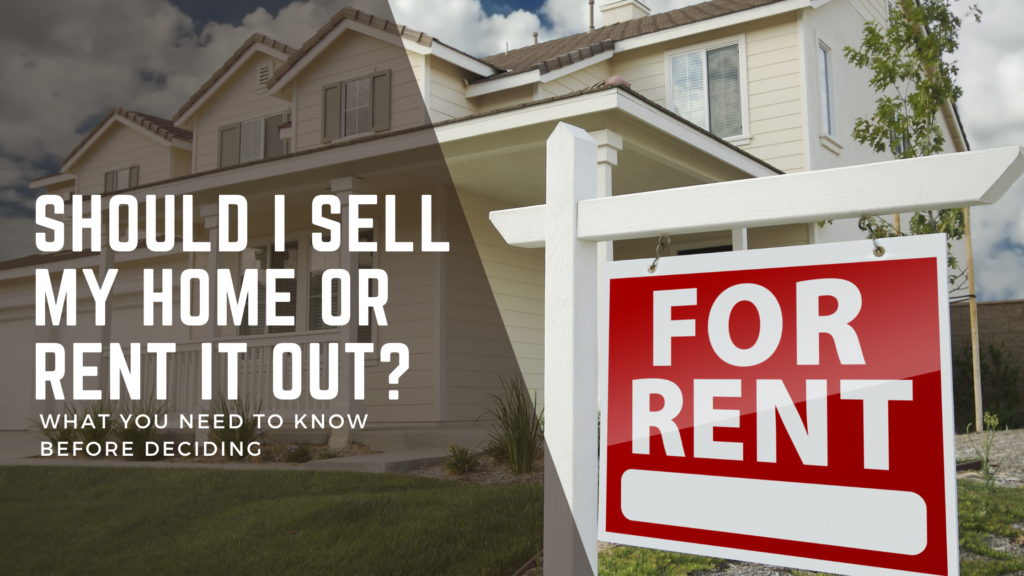Should I Sell My Home or Rent It Out? What You Need to Know Before Deciding

So, you’re on the fence: should you sell your home and cash in on its value, or should you rent it out and create a steady stream of income? It’s a question many homeowners grapple with, and the answer depends on a mix of personal goals, market conditions, and long-term planning. Let’s break down some factors to consider before making this major decision, and I’ll share some common mistakes you can avoid along the way.
1. Financial Goals and Cash Flow
First, what do you want out of this property? If you’re looking for immediate cash, selling your home may seem appealing—especially if property values have appreciated significantly. However, renting it out could create an additional income stream, one that grows over time as rents rise.
Pro Tip: Do the math. Rental properties often require maintenance and management, so it’s essential to calculate how much profit you’ll really make. A common mistake is not accounting for hidden costs like vacancies, repairs, property management fees, or even increased property taxes.
Questions to ask yourself:
- Will the rental income cover my mortgage, taxes, insurance, and other expenses?
- Am I in a market where rents are expected to rise or stagnate?
If the rental income will be just enough to cover costs, without leaving room for emergencies or unexpected expenses, selling might be the better option.
2. The Hassle of Being a Landlord
Owning a rental property is far from passive income. You’re stepping into the role of a landlord, which means handling everything from tenant screening to repairs, rent collection, and potentially evictions. If you’re planning on living far from the property or you simply don’t have the time, hiring a property management company might be a good option—but they typically take around 10% of your rental income.
Common Mistake: Underestimating the time and effort required to manage a rental property. Many people think renting is a set-it-and-forget-it investment. In reality, it often involves quite a bit of hands-on management, especially in the first few years.
What to consider:
- Do I have the time and patience to deal with tenants and repairs?
- Can I afford to hire a property manager if I can’t do it myself?
3. Capital Gains Taxes and Tax Benefits
Another major consideration is the tax implications of selling versus renting. When you sell a home that has appreciated in value, you may be subject to capital gains taxes. However, if it’s your primary residence, and you’ve lived there for two out of the last five years, you may qualify for significant exemptions.
On the flip side, owning a rental property comes with tax perks like the ability to deduct mortgage interest, repairs, and depreciation. In the long run, these benefits can make owning rental property more financially advantageous.
Common Mistake: Selling a property without considering the capital gains tax implications or missing out on tax benefits by not exploring rental property deductions.
4. Current Market Conditions
Right now, interest rates are high, and buyers are more cautious, but there’s also pent-up demand due to limited inventory. If you’re in a hot rental market where properties lease quickly and rental prices are rising, keeping the home might be a smart choice. On the other hand, if the property needs significant repairs to rent, or the rental market is soft, selling may give you more financial flexibility.
What to look at:
- How competitive is the rental market in your area?
- Is it a seller’s market or a buyer’s market?
- What’s the condition of the property? Will you need to sink a lot of money into repairs?
5. Long-Term Plans
How long are you planning to hold on to the property? Rental properties often make more sense as long-term investments because appreciation, rent growth, and tax benefits accumulate over time. If you’re in it for the long haul, keeping your home as a rental might build significant wealth.
On the other hand, if you’re unsure about holding on to the property for more than a few years, selling now while the market is favorable may be the better option.
Common Mistakes to Avoid:
Underestimating Costs: Failing to account for hidden expenses like property management, vacancy periods, repairs, and unexpected costs can erode any rental income you expect to generate.
Not Running the Numbers: Not using a rental property calculator or consulting a real estate professional to fully understand the cash flow and potential return on investment.
Overestimating Future Rent Increases: A common mistake is assuming rents will always increase year over year, which can lead to financial struggles during downturns or periods of high vacancy.
Not Preparing for Capital Gains Taxes: Selling without understanding the tax implications can lead to surprise tax bills. It’s always a good idea to consult with a tax advisor before making the leap.
Final Thoughts
Both selling and renting have their advantages, and the best decision will depend on your personal financial situation, your goals, and the current market conditions. The most important thing is to do your homework, run the numbers, and consider all the angles. And remember, whether you decide to sell or rent, you’re building toward your financial future—so make the decision that helps you sleep at night!
